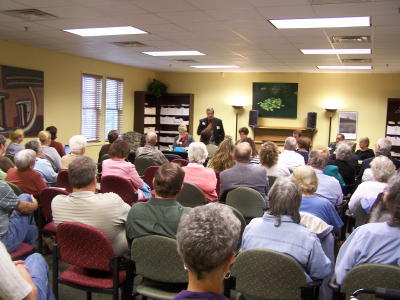"A COMMUNITY CONVERSATION" - Leaders Say They Support Community Schools

Conference participants discuss the
"Challenge for educational equality"
A number of state education leaders and legislators participated in Challenge WV's annual conference in October, held at Charleston's Covenant House. The theme was "Challenge for Educational Equality."
The guest panel included representatives from Gov. Joe Manchin's office, the State Board of Education, the WV School Building Authority and the WV Legislature.
Dr. Mark A. Manchin, the executive director of the state's School Building Authority, said "I want to dispel that the SBA is driven by the economies of scale model. Funding is available, tell local boards to submit their projects, we look at all of them."
"Consolidation is primarily a local board issue," Manchin said.
Several individuals during a Q&A session asked Manchin if there could be a disconnect between local school boards, who disagree regarding the influence of the SBA.
Manchin said he supports community-based schools.
"It's all about children and their safety and welfare. They all deserve an equal, quality education. The heart of the issue is how do we change long bus rides and keep our community schools," he said, not mentioning the state's school consolidation rampage of several years.
First Lady Gayle Manchin, who was appointed to the state Board of Education in March 2007, could not attend because of the new WVU president's inauguration.
"We know small schools offer many advantages. The governor and I remain strong in our stance to promote our small community schools. With on-line and Distance Learning being readily available, lack of teachers or curriculum cannot be an excuse," she said.
House Majority Leader Joe DeLong (Dem) said "Change begins with the community and the community needs to demand change from the legislature."
"Schools are the lifeblood of the community, I feel strongly about small schools, and tight knit communities."
"One of the biggest failures in WV schools is that 'Vo-Techs' are being used as dumping grounds for kids who are wanted out of the regular classroom," DeLong noted.
Barbara N. Fish, a member of the West Virginia Board of Education since December 2000, also serves as secretary of the West Virginia School Building Authority.
She said "State Board of Education can do a better job monitoring (bus) ride-time guidelines."
"I appreciate Challenge WV for being a 'watchdog' for WV education and what's best for the children. We need to incorporate distance learning and other available technology to community schools," Fish commented.
Sen. Donna Boley (Republican) from St. Marys, a long-time advocate for community-based education, said "Communities dry-up after school closings. How can we expect children to learn, after long bus rides, some up to an hour and 45 minutes?"
"There is no reason that we cannot keep our rural schools. Anything I can do to get local community schools to stay open, I'm all for." she told the conference.
Del. Stan Shaver, who is also principal at Fellowsville Elementary School in Preston County, is a member of the House Education Committee.
Shaver said "Good things happen in small schools. I'll be glad to sponsor any legislation Challenge proposes in support of small schools. "Just because a school is old, doesn't mean it can't be clean and safe."
Senator Ron Stollings (District 7) who is on the Senate Education Committee, told conference members that "Utilizing virtual classrooms may be the key to teacher shortage and bringing test scores up to par."
Challenge's Linda Martin reminded the leaders that most West Virginians are paying attention to what is being done to their community schools.
Martin said leaders often give lip service to the importance of community schools, but turn around and move toward merging, centralizing and consolidating.
"Many certainly ignore the research about what works, and then start blaming when the outcomes keep hitting the bottom," Martin said.